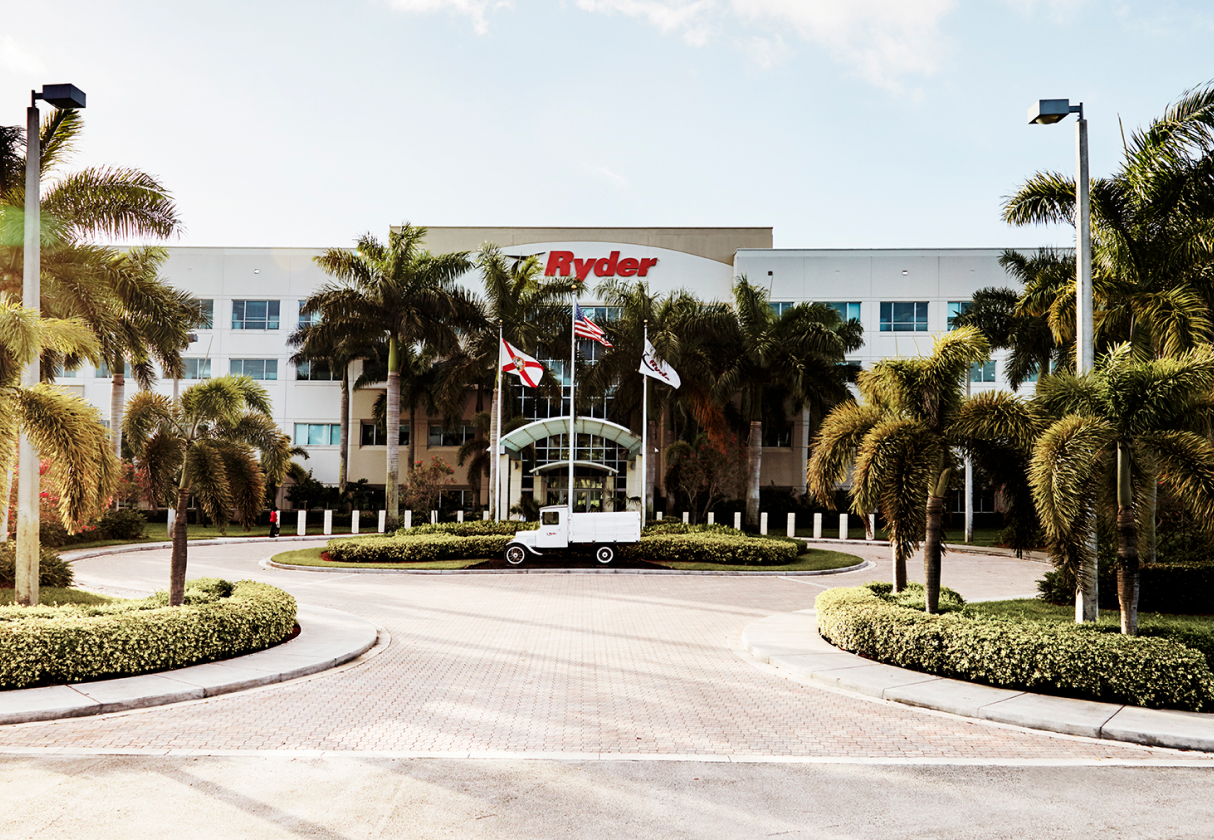Ryder System, Inc. (Ryder), headquartered in Miami, Florida, is a publicly traded (NYSE: R) corporation founded in 1933. We are a leading provider of outsourced logistics and transportation solutions to commercial customers. Ryder’s mission is to provide innovative solutions that are reliable, safe, and efficient, enabling our customers to deliver on their promises. We seek to deliver compelling solutions that will convince customers to outsource their fleet management and supply chain needs to us. We operate primarily in three business segments: Fleet Management Solutions (FMS), Supply Chain Solutions (SCS), and Dedicated Transportation Services (DTS).
FMS offers full service leasing and leasing with flexible maintenance options, commercial rental, and contract or transactional maintenance services of trucks, tractors, and trailers to customers principally in the United States, Canada, and the United Kingdom. SCS provides comprehensive supply chain solutions, including distribution and transportation services in North America. Within the United States, DTS provides vehicles, drivers, and managerial support as part of a dedicated transportation solution.
Our total revenue in 2020 was approximately $8.4B. For more information about our business, products, and financials, see our 2020 10-K.
As of December 31, 2020, Ryder had approximately 39,000 employees worldwide. A breakdown of our United States and Canada employees based by location, gender, and employment type can be found below.
Locations
COUNTRIES
- United States of America
- Canada
- Mexico
- United Kingdom
Employees – United States & Canada
|
|
Male
|
Female
|
U.S.
|
Canada
|
Total
|
|---|---|---|---|---|---|
Permanent (full-time) |
27,076 |
6,315 |
31,565 |
1,826 |
33,391 |
Permanent (part-time) |
459 |
55 |
488 |
26 |
514 |
Temporary (full-time) |
25 |
34 |
49 |
10 |
59 |
Temporary (part-time) |
47 |
14 |
60 |
1 |
61 |
Full-time |
27,101 |
63,49 |
31,614 |
1,836 |
33,450 |
Part-time |
506 |
69 |
548 |
27 |
575 |
Total |
27,607 |
6,418 |
32,162 |
1,863 |
34,025 |
SUPPLY CHAIN
Vehicle and Parts Procurement
Ryder maintains relationships with a number of Original Equipment Manufacturers (OEMs) who provide us with the vehicles and vehicle parts necessary to meet our customers’ needs and specifications. For leased units, Ryder’s sales team works with the customer to define the appropriate vehicle specification for the customer’s application and use. For rental units, Ryder defines its desired vehicle specification internally based on customer demand. Once the vehicle has been built, we maintain service level agreements with manufacturers to ensure that the vehicle is delivered to a Ryder location in a timely manner for in-servicing, or to a body manufacturer if the unit requires the installation of a truck body, such as a flat bed, box, or a refrigeration unit.
For vehicle parts, in addition to sourcing from both OEMs and non-OEMs, Ryder has also partnered with a limited number of distributors. These distributors work in conjunction with OEM and non-OEM parts suppliers to stock and warehouse parts on behalf of Ryder and deliver to Ryder facilities.
Fuel Procurement
We provide our FMS customers with access to diesel fuel at competitive prices at our maintenance facilities across the United States and Canada. We also provide fuel services such as fuel planning, fuel tax reporting, centralized billing, fuel cards, and fuel monitoring. For each of our geographic markets, we invite several fuel refineries and re-sellers to bid on Ryder’s fuel volume. We may engage multiple suppliers for a given area depending on our internal assessment of anticipated volume. To ensure that we have adequate fuel supply to mitigate against natural disasters or other supply disruptions, we also maintain relationships with suppliers outside of a given market that offer us the ability to make on-demand fuel purchases and/or provide delivery of fuel to designated areas where it is most needed.
INITIATIVES & MEMBERSHIPS
Ryder engages directly with organizations that support or influence the transportation and supply chain industries. Our main memberships include:
American Trucking Association (ATA)
American Transportation Research Institute (ATRI)
International Warehouse & Logistics Association (IWLA)
Truck Renting & Leasing Association (TRALA)
U.S. Chamber of Commerce
By taking an active role in our member organizations, including through our position on various boards, committees, and councils within these organizations, we increase our available resources to learn and share best practices. These memberships also provide Ryder with an avenue to help shape the dialogues that greatly impact our industry and business.
Ryder also participates in the annual CDP Climate Change survey; find our responses here.
Our sustainability strategy, impact and goals
At Ryder, we strive to integrate corporate responsibility and sustainability into every aspect of our business, and understand that sustainability goes hand-in-hand with maintaining economic viability. In a rapidly evolving world, sustainability continues to have a positive correlation with improved cost of capital, financial performance, and operational efficiencies.
LEARN MORE
Strategic direction & oversight of management
The Board works closely with Ryder’s Leadership Team to make our strategy a reality. Each year, the Board, Leadership Team, and other members of senior management meet to discuss the business environment, industry trends, competitive dynamics, and our strategic initiatives and long-term strategy.
Learn More
